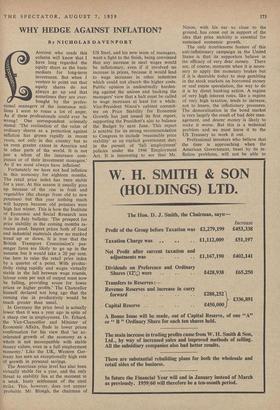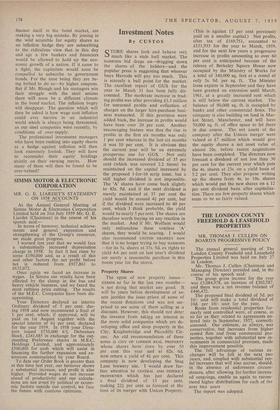WHY HEDGE AGAINST INFLATION?
By NICHOLAS DAVENPORT Fortunately we have not had inflation In this economy for eighteen months. The retail price index has been stable for a year. At this season it usually goes up because of the rise in fruit and vegetables (the change from old to new potatoes) but this year nothing much will happen because old potatoes were high last winter. This is how the Institute of Economic and Social Research sees it in its July bulletin: 'The prospect for price stability in the coming months re- mains good. Import prices both of food and industrial materials show no marked trend up or down. It is true that the British Transport Commission's pas- senger fares are likely to go up in the autumn but it would take a 20 per cent. rise here to raise the retail price index by a quarter of a point. With produc- tivity rising rapidly and wages virtually stable in the lull between wage rounds, labour costs per unit of output must now be falling, providing scope for lower prices or higher profits.' The Chancellor himself declared not long ago that the coming rise in productivity would be much greater than usual.
In Germany the price level is actually lower than it was a year ago in spite of a sharp rise in employment. Dr. Erhard, the Vice-Chancellor and Minister of Economic Affairs, finds in lower prices confirmation for his view that 'an ac- celerated growth of the economy as a whole is not incompatible with stable money values, even in a full employment economy.' Like the UK, Western Ger- many has seen an exceptionally high rate of growth in personal savipgs.
The American price level has also been virtually stable for a year, and the only threat to stability lies at the moment in a weak, hasty settlement of the steel strike. This, however, does not appear probable. Mr. Blough, the chairman of US Steel, and his new team of managers, want a fight to the finish, being convinced that any increase in steel wages would be inflationary, even if it involved no increase in prices, because it would lead to wage increases in other industries which could not absorb the higher costs. Public opinion is undoubtedly harden- ing against the unions and backing the managers' view that a halt must be called to wage increases at least for a while. Vice-President Nixon's cabinet commit- tee on Price Stability for Economic Growth has just issued its first report, supporting the President's aim to balance the Budget by next June. This report is notable for its strong recommendation to Congress to include 'reasonable price stability' as an explicit government duty in the pursuit of 'full employment' policies under the 1946 Employment Act. It is interesting to see that Mr. Nixon, with his ear so close to the ground, has come out in support of the idea that price stability is essential for sustained economic growth.
The only troublesome feature of this anti-inflationary campaign in the United States is that its supporters believe in the efficacy of very dear money. There are, of course, moments when it is neces- sary to apply the monetary brakes but if it is desirable today to stop gambling in the stock markets on borrowed money or real estate speculation, the way to do it is by direct banking action. A regime of very high interest rates, like a regime of very high taxation, tends to increase, not to lessen, the inflationary pressures. The demoralisation in the bond market is very largely the result of bad debt man- agement, and dearer money is likely to make it worse. But this is a technical problem and we must leave it to the US Treasury to work it out.
Professional investors who believe that the time is approaching when the American Government, beset by its in- flation problems, will not be able to
finance itself in the bond market, are making a very big mistake. By joining in the wild scramble for equity shares as an inflation hedge they are subscribing to the ridiculous view that in this day and age a few bankers and financiers would be allowed to hold up the eco- nomic growth of a nation. If it came to a fight, the capitalists would soon be compelled to subscribe to government bonds. For the time being they are be- ing bribed to do so—by higher coupons. But if Mr. Blough and his managers win their struggle with the steel unions there will soon be a different climate in the bond market. The inflation bogey will disappear. The question which will then be asked is how wage cost inflation could ever survive in an industrial world which is always being threatened, as our steel companies were recently, by conditions of over-supply.
The professional investment managers who have been rushing into equity shares as a hedge against inflation will then look extremely foolish. They will have to reconsider their equity holdings strictly on their earning merits. How many of them will then be found to be over-valued?



























 Previous page
Previous page